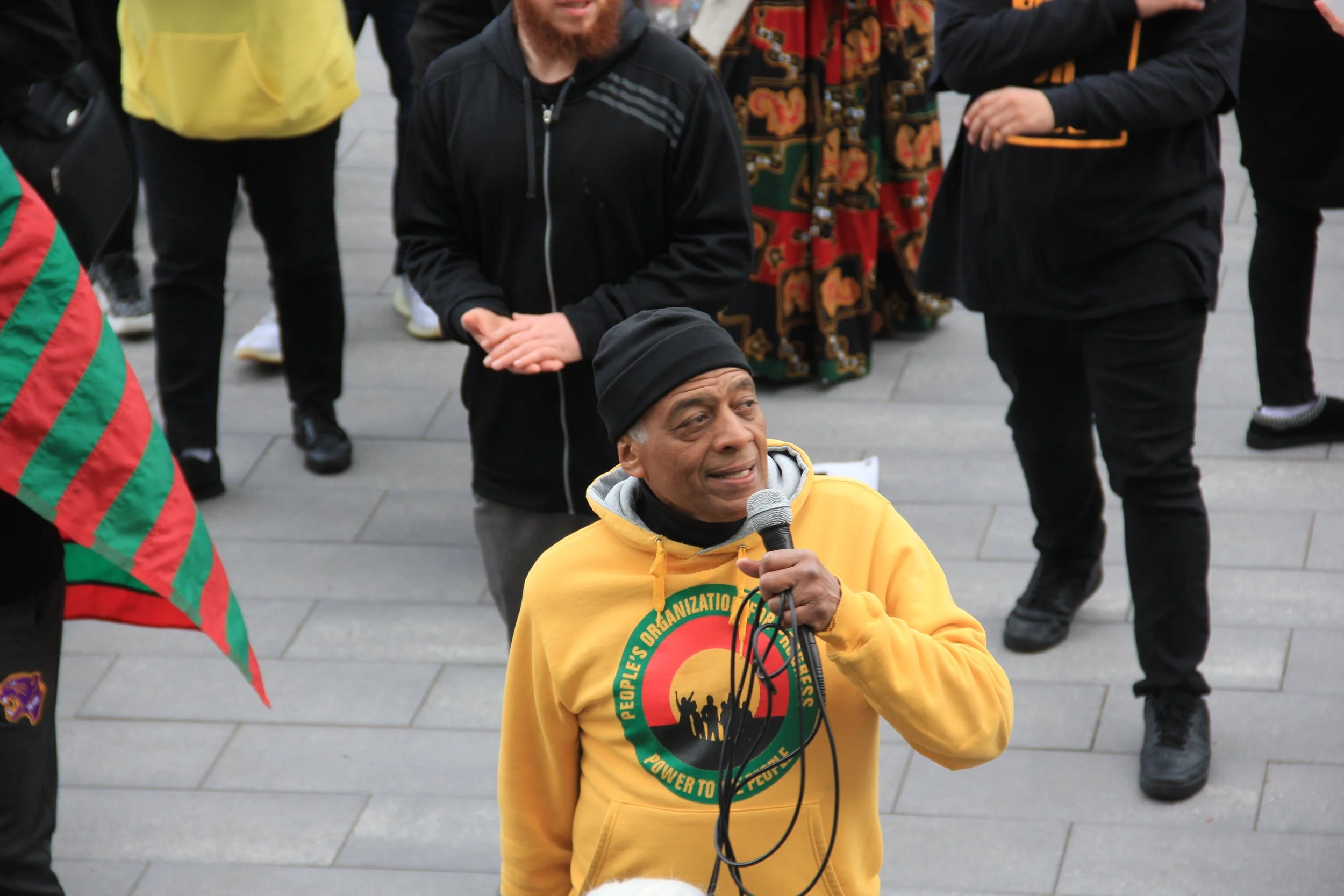In Defense of the Right to Protest
Lawrence “Larry” Hamm gives a speech among protestors at the Voting Rights March on Jan. 15, 2022. (Josie Gonsalves for Public Square Amplified)
This story was produced as part of the Democracy Day journalism collaborative, a nationwide effort to shine a light on the threats and opportunities facing American democracy. Read more at usdemocracyday.org.
Lawrence Hamm’s life links the most powerful social movements of the last 50 years. Appointed to the Newark, New Jersey Board of Education in 1971 at the age of 17, he balanced the radical world of Newark’s Black Power Movement with a racially-divided city’s practical public policy concerns. What were his rewards? Harsh criticism in the press, dropping out of Princeton University, being publicly attacked by the man who appointed him—Kenneth Gibson, Newark’s first Black mayor—and an attempted framing on a gun he never had. His greatest accomplishment was helping to found the People’s Organization for Progress, a grassroots activist group that for the past 39 years has been a fixture in New York tri-state area activist circles. From fighting to free Mandela in the 1970s and 1980s to protesting local police brutality cases in George Floyd/Breonna Taylor 2020 and beyond.
We are living through one of the darkest chapters in our nation’s history. The United States is sliding towards anti-democratic, racist, and fascist forces that threaten the future of the country. Voting rights, women’s rights, workers’ rights, gay rights, immigrant rights and the rights of others are being targeted and suppressed.
And so is the right to protest.
Most people may not be aware of the laws, policies, and procedures instituted to impede and circumscribe the right to protest.
These efforts pose a threat to democracy because the right of citizens to protest to redress their grievances is a hallmark of a democratic society. Grassroots protest is a means by which people can hold elected officials and governments accountable.
It is a nonviolent way to bring about social change. People cannot push back against unfair and unjust policies, laws, and practices without the right to protest. Their voices are muted, and a path to tyranny is opened.
In recent years, several local and state governments and college and university administrations have made it more difficult for the public and students to have demonstrations. Around the country, they have put in place permitting processes or made existing ones more onerous with insurance requirements, fines and penalties if violated.
They have tried to regulate where, when, and how protests will occur and tried to prevent them from happening. Certain groups have been banned from having protests about issues, and others have been banned altogether from having any protests.
When protests are held, police appear in large numbers, sometimes outnumbering the protesters. In some cases, not only are they there to intimidate, but it appears that they are there to stop or break up the protests even when they are peaceful.
We must reaffirm the right to protest for a just cause, especially when right-wing racist and fascist movements try to silence voices for equality and justice.
Grassroots protest becomes increasingly important when government and institutions appear less responsive to the needs of the people.
Protests for just causes have been a potent force in the struggle for freedom, justice, and equality. The right to protest must not be diminished or extinguished. It must be protected. Let us do all we can to preserve and strengthen this right for ourselves and future generations.
During his speech the night before he was assassinated, Dr. King told the crowd that another march in support of the striking sanitation workers was going to take place in Memphis but that those opposed to the march had filed an injunction in court to stop it.
But somewhere I read of the freedom of assembly. Somewhere I read of the freedom of speech. Somewhere I read of the freedom of the press. Somewhere I read that the greatness of America is the right to protest for right. And so just as I say, we aren’t going to let any injunction turn us around. We are going on.
Dr. Martin Luther King, “I See the Promised Land.” His last speech was delivered on April 3, 1968, in Mason Temple, Memphis, TN.
However, he said they would protest anyway because the right to protest for a just cause made America great. These words ring as true today as they did when King said them 54 years ago.
The protest was a powerful tool of the Civil Rights Movement. It was an effective tool for social change in the past, remains so in the present, and will continue to be so in the future.
The right to protest must be highlighted not only for its intrinsic value but because it is a right being challenged in this country today.
Guest Editor, Ande Richards.


